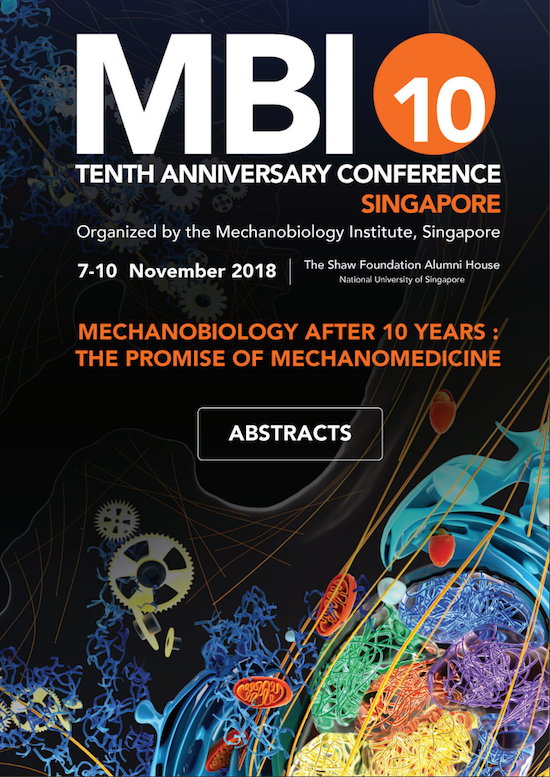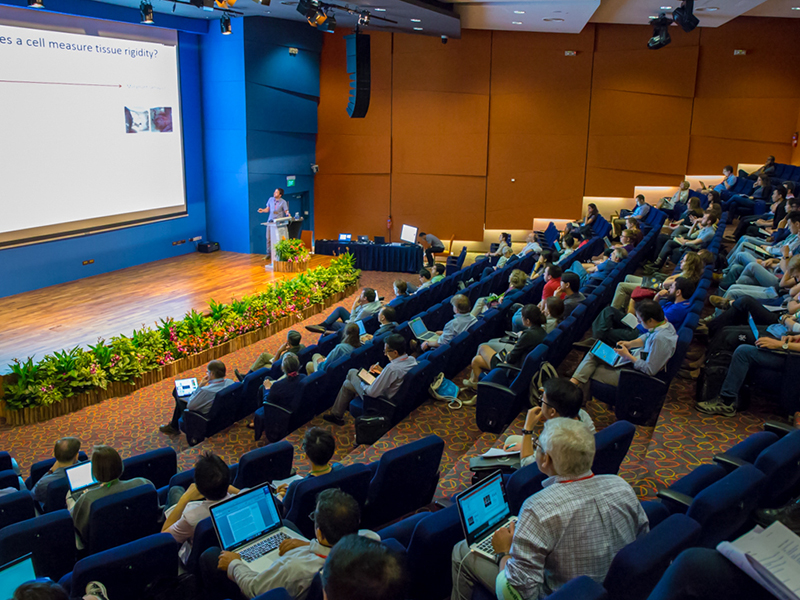MBI10: Celebrating a decade of mechanobiology
The Mechanobiology Institute’s 10th Anniversary Conference Post-Event Report
Written by Sruthi Jagannathan | December 2018
It has been ten years since the Mechanobiology Institute (MBI) was established as a Research Centre for Excellence that would spearhead research in the emerging field of mechanobiology. Hosted at the National University of Singapore, and supported by the National Research Foundation and Ministry of Education, Singapore, MBI set off on this mission right from the start, and has successfully positioned itself as the world-leading institute in this interdisciplinary field, carrying out cutting edge, high-impact studies at the interface of biology, physics, mathematics, and computational sciences.
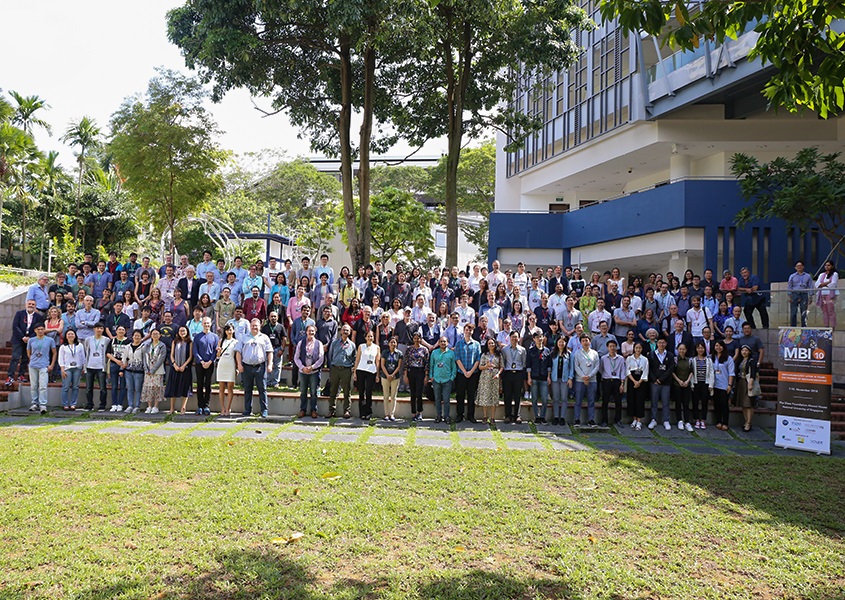
Participants of the MBI10 conference
To commemorate its achievements and successes over the past decade, and to set out new goals and research directions for the coming years, the Mechanobiology Institute’s 10th Anniversary Conference was recently held at the Shaw Foundation Alumni House, National University of Singapore, on 7-10 November 2018. Titled ‘Mechanobiology After 10 Years: The Promise of Mechanomedicine’, the four-day conference was an intellectual feast; it brought together pioneering scientists along with young researchers and students under one roof to engage in highly stimulating and fruitful discussions under the increasingly diverse umbrella of mechanobiology. In total, more than 250 participants attended the conference, with approximately one third of the attendees travelling from overseas.

Address by NUS President, Professor Tan Eng Chye
Marking the significance of the occasion, several honorary guests graced the inaugural session of the conference. The NUS President Professor Tan Eng Chye delivered a special address, reflecting on the decade-long journey of MBI as a Research Centre for Excellence and its contributions in basic research as well as in the innovation of new tools and technologies.
MBI Founding Director Professor Michael Sheetz opened the conference, taking the audience through the history of MBI, from the initial proposal led by Professor Hew Choy Leong, to the challenges in establishing the open-lab culture that is a hallmark of MBI, and the successes in training PhD students and post-doctoral fellows, many of whom have gone onto start their own research groups in Mechanobiology.
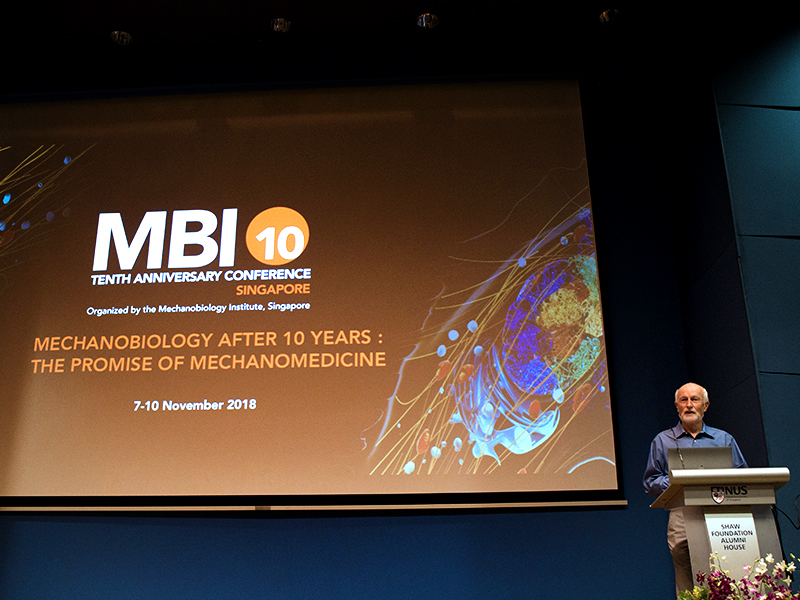
Welcome Address by MBI Director, Professor Michael Sheetz
In attendance were also several distinguished guests, including the Israeli Ambassador to Singapore, Her Excellency Simona Halperin, reaffirming the long-standing collaboration between MBI and the Weizmann Institute, Israel. Attendees from other long-standing partner organizations such as CNRS, France, IFOM-FIRC Institute of Molecular Oncology, Italy, and the National Centre for Biological Sciences, India were also present, along with Directors from other Research Centres of Excellence within Singapore, and members of the MBI Governing Board.
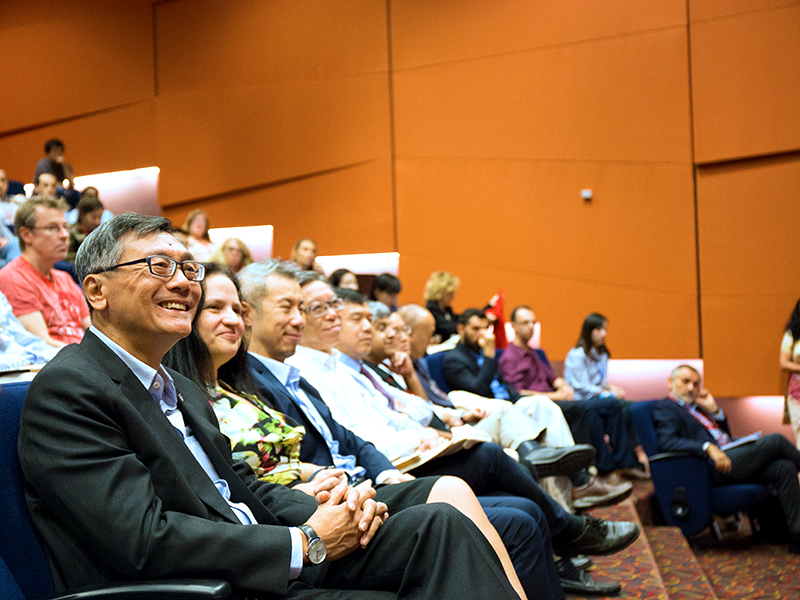
Distinguished guests at the MBI10 opening session
Presenting the various scientific talks during the conference were distinguished scientists representing prestigious academic and research institutions from all over the world, many of whom have successfully collaborated with MBI over the years. The 4-day program included an interesting line-up of close to 60 talks, spread across eight major themes: Mechanics of Cancer, Cell-Cell Interactions, Cellular Architecture at Different Scales, Pathogenesis, Developmental Mechanics, Transcription Regulation and Stem Cell Biology, Single Molecule Biophysics, and Cell Dynamics and Migration.
Experts in each of these specific areas spoke in great detail on the latest findings from their labs and its implications in the wider field. The ideas discussed under various themes ranged from how single molecules within cells unfold and refold in response to forces arising from outside the cell, to how proteins can dynamically remodel their architecture to form multi-component complexes that enable specific cell functions such as probing the physical properties of its surroundings (e.g. neighboring cells or surrounding connective tissue). Other talks focused on the downstream effects of this mechanosensing, such as how such mechanical information from cellular environment is relayed to the signal-processing core of the cell- its nucleus- and how this leads to alterations of genetic instructions, enabling the cell to perform specific tasks, such as cell migration, division, growth, programmed death, or even becoming a new cell type.
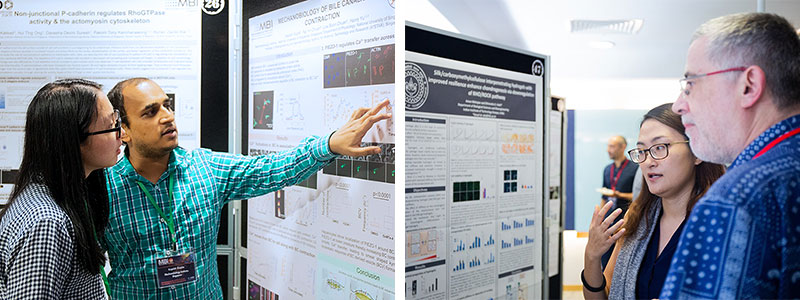
Scientific discussions during the poster sessions
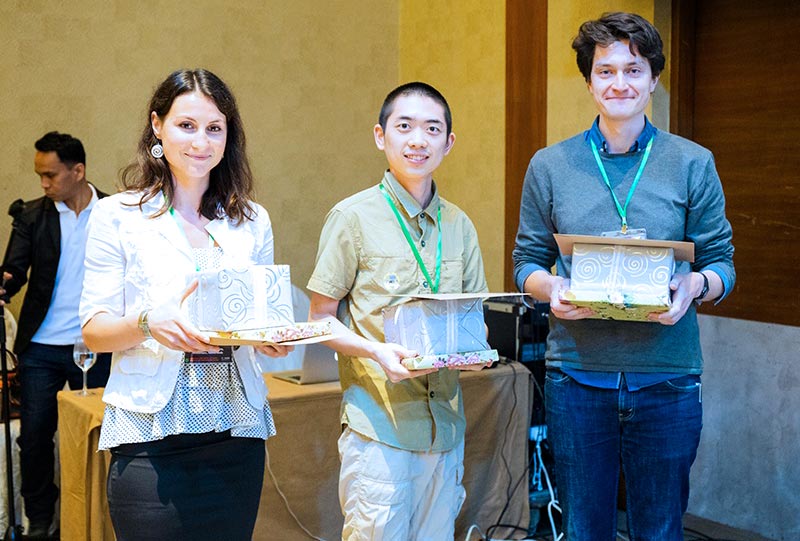
Winners of the Best Poster Awards (from l to r): Sveta Malinova, University Medical Center, Netherlands; Yuan Lue Zhen, Mechanobiology Institute, National University of Singapore; Lucas Milles, Ludwig Maximilian University, Germany
These ideas, woven together, represent the core principles of Mechanobiology, i.e., how cells adapt their functions in response to mechanical signals from their surroundings. As MBI has demonstrated since its formation, incorporating these principles is essential for complete understanding of cell biology, and for determining what goes awry in disease states such as cancers or pathogenic infections. Running throughout the conference were presentations on how recent advancements in mechanobiology have inspired the development of new tool and methodologies that could be applied in the diagnosis, management, or treatment of diseases. And there lies the promise of mechanomedicine – the central theme of this scientific meeting.

More discussions during coffee breaks
Amidst the talks, more scientific discussions flowed into the poster sessions during lunch and dinner over the 4 days. More than 60 posters were on display – presented mainly by students and early career scientists – who used this platform to showcase and discuss their research, and gather valuable feedback and inputs from their peers and established researchers.
However, it was not just serious science all the time; there was room for some fun, relaxation, and networking too. The conference banquet at the Kent Ridge Guild House, National University of Singapore, provided an evening of all this and much more; with a great spread of food and beverage accompanied by a line-up of uplifting cultural performances from the NUS Centre of the Arts, the banquet provided the conference participants a great opportunity to form new friendships and foster new scientific collaborations.
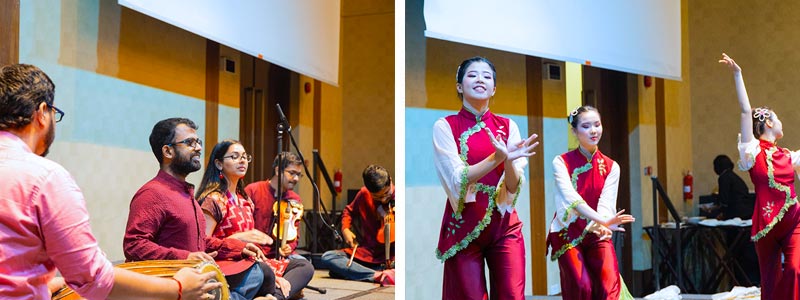
Cultural performances from the NUS Centre for the Arts
Altogether, the Mechanobiology Institute’s 10th Anniversary Conference was hugely successful in driving scientific discussions, advancing the current understanding of this highly promising, interdisciplinary science, and generating collaborative ideas that could become seeds of innovation in the future.


